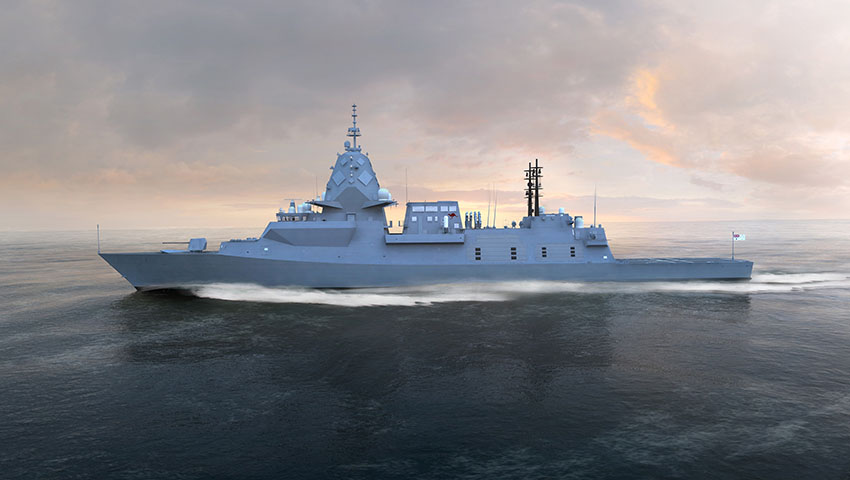Defence Minister Linda Reynolds and Defence Industry Minister Melissa Price have announced a major contract signing to support the prototyping of the Royal Australian Navy’s Hunter Class future frigates and a critical Australian industry.
To continue reading the rest of this article, please log in.
Create free account to get unlimited news articles and more!
Australian company BlueScope Steel AIS has signed a contract with ASC Shipbuilding, a subsidiary of BAE Systems Australia, to deliver more than 1,500 tonnes of steel plate, which will be used to construct five ship blocks in the prototyping phase of the program.
The blocks will then test processes, systems, tools, and facilities prior to construction commencing on the first of nine frigates by end 2022.
Defence Minister Linda Reynolds welcomed the announcement, saying, “This latest contract signing demonstrates the progress being made on the Hunter Class Frigate Program, which will form the foundation of the Morrison government’s $90 billion National Naval Shipbuilding Program.”
Under the $2.6 million contract, BlueScope Steel AIS will deliver more than 1,500 tonnes of steel plate to ASC Shipbuilding.
This is the first of a number of contracts ASC Shipbuilding will award to Australian businesses in the lead up to the Hunter program’s prototyping phase and realises the company’s commitment to use Australian steel for the $35 billion Hunter Class Frigate Program.
Minister Reynolds added, “Prototyping is an essential phase when building any complex warship, and will ensure employees at ASC Shipbuilding are thoroughly trained in using the state of the art digital equipment in one of the world’s most advanced shipyards at Osborne South in Adelaide.
“This first phase is key to the Hunter Class program, which when complete will provide the Royal Australian Navy with a regionally superior anti-submarine warfare capability,” Minister Reynolds said.
During prototyping, five representative ship ‘blocks’ will be built at the world-class Osborne Naval Shipyard in South Australia.
During this phase, the processes, systems, tools, facilities and workforce competencies will be extensively tested and refined before construction commences on the first frigate in 2022.
Defence Industry Minister Melissa Price expanded on this, saying, “This is all about Aussie jobs and creating a skilled Australian workforce to deliver nine frigates for our Navy.
“It is important, now more than ever, to back Australian businesses and create more Australian jobs, that’s why we’re building Australian ships with Australian steel by Australian workers.”
ASC Shipbuilding managing director Craig Lockhart said, “Today’s contract signing is the first of many contracts that we will award to Australian businesses in coming months, as we count down to prototyping cut steel in December.
“During the prototyping phase we expect to spend 90 per cent of the value of the work required to construct the test blocks, in Australia, and I hope today’s contract signing is the start of a long-term relationship with BlueScope Steel AIS.
“The Hunter program is about more than just building warships; it is about building an enduring and uniquely Australian sovereign industrial capability that will support Australia’s continuous naval shipbuilding strategy for generations to come.”
BlueScope chief executive, Australian steel products, John Nowlan, welcomed the contract, saying, “BlueScope is very pleased to be chosen by ASC Shipbuilding, a subsidiary of BAE Systems Australia to supply steel into the prototyping phase of the Hunter Class Frigate Program.
“The company has a long and proud history of supplying steel into defence projects – in the 1990s we supplied more than 20,000 tonnes of steel into the original Anzac Class frigate fleet that the Hunter Class ships will replace.
"Manufacturing is a key part of Australia’s history and today BlueScope is not only a world class manufacturer but we are also internationally competitive.”
ASC Shipbuilding will design and build nine Hunter Class ships, which will be among the world’s most advanced anti-submarine warfare frigates, for the Royal Australian Navy.
The steel contract comes as ASC Shipbuilding undertakes a range of initiatives to develop a sovereign industrial capability for Australia.
These collaborative programs with industry and academia will form the foundation of the digital shipbuilding framework that will be developed further during prototyping, increasing Australian industry’s capability and capacity to contribute to complex naval shipbuilding programs, now and in the future.
The nine Hunter Class frigates will be based on the BAE Systems Type 26 Global Combat Ship currently under construction for the Royal Navy and will replace the eight Anzac Class frigates when they enter service beginning in the late 2020s.
The Hunter Class is billed as an anti-submarine warfare (ASW) centric vessel delivering an advanced ASW capability to the Royal Australian Navy at a time when 50 per cent of the world’s submarines will be operating in the Indo-Pacific region.
BAE Systems Australia announced that it had selected Lockheed Martin Australia and Saab Australia as combat systems integration industry partners, responsible for delivering the Australian designed CEAFAR 2 Active Phased Array Radar, Lockheed Martin designed Aegis combat management system and Saab Australia 9LV tactical interface.
The $35 billion program sees ASC Shipbuilding become a subsidiary of BAE Systems throughout the build process beginning in 2020 at the Osborne Shipyard in South Australia, creating more than 4,000 jobs.
BAE Systems expects the Australian industry content (AIC) for the Hunter Class build will be 65-70 per cent, which will create and secure thousands of jobs for decades.
At the end of the program the Commonwealth will resume complete ownership of ASC Shipbuilding, thereby ensuring the retention in Australia of intellectual property, a highly skilled workforce and the associated equipment.
SEA 5000 is expected to support over 500 Australian businesses who have been pre-qualified to be part of the Hunter Class supply chain, with the Australian steel industry in particular, benefiting from the 48,000 tonnes of steel required to build the ships.

 Login
Login







